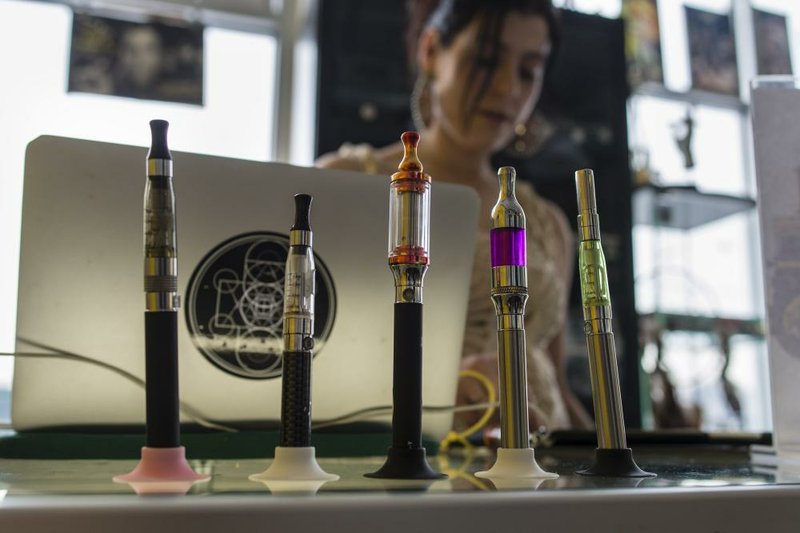The federal government’s proposal to regulate the $3 billion e-cigarette market, issued Thursday by the Food and Drug Administration, bans sales to anyone under 18, adds warning labels and requires FDA approval for new products.
Some public-health experts say a measured approach is the right one. They think that the devices, which heat a nicotine solution to produce an odorless vapor without the smoke and tar of burning tobacco, can help smokers quit.
“This could be the single biggest opportunity that’s come along in a century to make the cigarette obsolete,” said David Abrams, executive director of the Schroeder Institute for Tobacco Research and Policy Studies at the American Legacy Foundation.
Scientists haven’t finished much research on e-cigarettes, and the studies that have been done have been inconclusive. The government is pouring millions into research to supplement independent and company studies on the health risks of e-cigarettes and other tobacco products - as well as who uses them and why.
“There are far more questions than answers,” acknowledged Mitch Zeller, director of the FDA’s Center for Tobacco Products. But “for the first time there will be a science-based, independent regulatory agency providing gate keeping,” he said. “The regulator will finally be doing its job.”
Consumer groups have said manufacturers of the devices use candy flavors, TV ads and music-festival sponsorships to target youth, who doubled their use of the products in 2012 from a year earlier. Agency officials called Thursday’s proposal a foundation that may lead to tighter control in the future.
The FDA gained the authority in 2009 to regulate nicotine vaporizers and cigars. The latest plan, open to public comment for 75 days, would require manufacturers, and cigar makers, to give the agency ingredient lists. The rules also will apply to pipe tobacco and hookah tobacco. There is no timetable for when the FDA will issue its final rules. Many believe the process will wind up in court.
Zeller said he’s confident that the agency would be able to back up the regulatory proposals with science.
Victor Oliver, manager and operator of RAO Video in Little Rock, said he supports the proposed regulations, noting that the requirements proposed so far seem to be ones that consumers would expect on nearly any product.
Although Oliver’s store on Main Street doesn’t sell its nicotine vaporizer products to anyone younger than 18, he thinks making the age requirement an industry wide rule is a good idea. RAO Video first began selling vaporizer products in October.
Angela Goodman, co-owner of Smooth Vapes in Bentonville, said basic regulation of the industry is a good idea, but she is against implementing burdensome taxes on the product.
She said Smooth Vapes won’t sell vaporizer products to customers 17 or younger. She said the samples offered at the store are nicotine free and that she wouldn’t hesitate to put nicotine warnings on the “juice” sold by Smooth Vapes, pointing out that it already comes in childproof containers.
Goodman said Smooth Vapes opened its doors a little over a year ago, when only one other seller was in town, and since then several others have popped up in the region.
Bonnie Herzog, an analyst with Wells Fargo & Co., said in a note to clients that the proposal isn’t “as bad as feared” and is a “positive for the industry.”
She expects that the process to finalize the regulations could take as long as two years.
Most vaporizers deliver nicotine while leaving out the tars, arsenic and other chemicals common in tobacco products. The devices were added at the end of last year to a New York City ban on smoking in restaurants, bars, offices and parks. Chicago and Los Angeles followed with similar restrictions.
Graham Hubert, a 29-yearold set builder in New York, used traditional cigarettes for 10 years before switching to a vaporizer. He views them as an alternative that may have fewer side effects.
“I’m concerned … that we don’t know much about the long-term side effects,” Hubert said. “But I do know the long term side effects of smoking, so I’d rather be smoking an e-cigarette.”
He said the devices should be regulated similarly to cigarettes, especially in banning sales to minors.
“When you’re a young person there should be a way to limit the amount of addiction you have,” Hubert said. “I didn’t smoke when I was a teenager. Why make something available to a kid that they don’t need?”
Cigarettes already must meet FDA review standards, minimum-age requirements and display warnings. Traditional cigarettes also are banned from online sales, TV advertising, sponsorships and the use of flavors. Menthol is permitted while the ingredient is under FDA review.
While companies such as Altria and Reynolds American Inc. have been under the FDA’s authority since Congress gave the agency power over the $90 billion tobacco industry in 2009, vaporizers and cigars haven’t been subject to the same oversight.
The law passed about five years ago “and a lot has happened on a lot of different tobacco products without any regulatory activity by the FDA,” Gregg Haifley, associate director of federal relations with the American Cancer Society’s Cancer Action Network, said before the proposal was released. “We’re disappointed that it has taken this long.”
Industry sales may reach $5 billion in 2015, according to Bloomberg Industries, which had previously predicted $6 billion in sales but lowered the figure to reflect growing bans on where they can be consumed.
The FDA also is asking for comment on whether premium cigars should be included in the agency’s regulation, the FDA’s Zeller said. He wouldn’t say when the proposal might become final.
Information for this article was contributed by Michael Felberaum and Matthew Perrone of The Associated Press; by John Magsam of the Arkansas Democrat-Gazette; and by Anna Edney and Sonali Basak of Bloomberg News.
Front Section, Pages 1 on 04/25/2014
